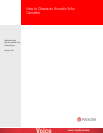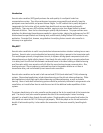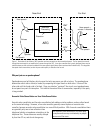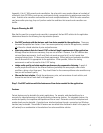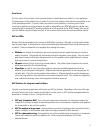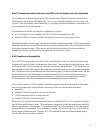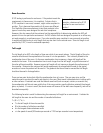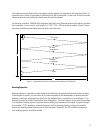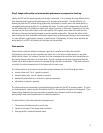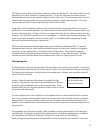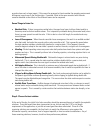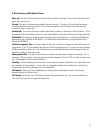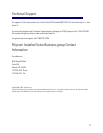acoustics have such a large impact. If this cannot be arranged, at least consider the operating environment
differences in each case in the final decision. If possible, listen to the room acoustics with the echo
canceller disabled so the effects of the different rooms can be compared.
Seven Things to Listen For
• Residual Echo. If there is excessive residual echo, the sound may have a hollow, distant quality or
there may even be distinct audible echoes. This is especially noticeable during the receive mode, when
there is no near speech to mask the echo. If this is due to a short tail length, the residual echo may
sound delayed.
• Loss of Convergence. When the echo canceller loses convergence, the result is an audible residual
echo that could be louder than an echo with no echo canceller at all. This is generally caused when
the state machine mistakes a double-talk situation for a receive state. If this happens, the echo
canceller begins to adapt to the near talker’s speech as well as the echo, and goes out of convergence.
• Howling. Pitched squealing noises may occur when both parties have hands-free systems with open
speakers and mics. This is caused by either a lack of howling rejection, or howling rejection that is not
working properly.
• Attenuated Speech During Double-talk. Noticeable changes in volume levels may occur during
double-talk. This is caused when the state machine mistakes double-talk for a receive state, and
applies switch loss (attenuates the near signal to reduce the residual echo level).
• Half-duplex Behavior. This is basically an extreme case of attenuated speech during double-talk. If
one of the sides is attenuated so much as to become inaudible, then it would be impossible for them to
interrupt the other party.
• Clipped or Noisy Speech During Double-talk. Very harsh and annoying distortion can be added to
the speech signal when nonlinear processing (usually center clipping) is applied during double-talk.
The speech may be distorted beyond recognition. This occurs when the state machine reports a receive
state during double-talk.
• Audible State Transitions. Audible changes in background noise level, clicks, or changes in overall
volume levels may be noticeable during state transitions. This may even occur between words or short
pauses in speech. This is caused by a state machine that switches between states too abruptly, or too
often.
Step 4: Choose the best solution.
At the end of the day, the initial list of echo cancellers should be narrowed down to a handful of acceptable
solutions. Those that would have been inconvenient to use, did not meet the G.167 or tail length
requirements of the application, or just did not sound good have been eliminated. Since all of the
remaining solutions are acceptable, the final task is to weigh the differences in price against the
differences in quality, convenience, level of support required, or time to market considerations. Any of
these remaining solutions, however, should not have performance problems.
11



